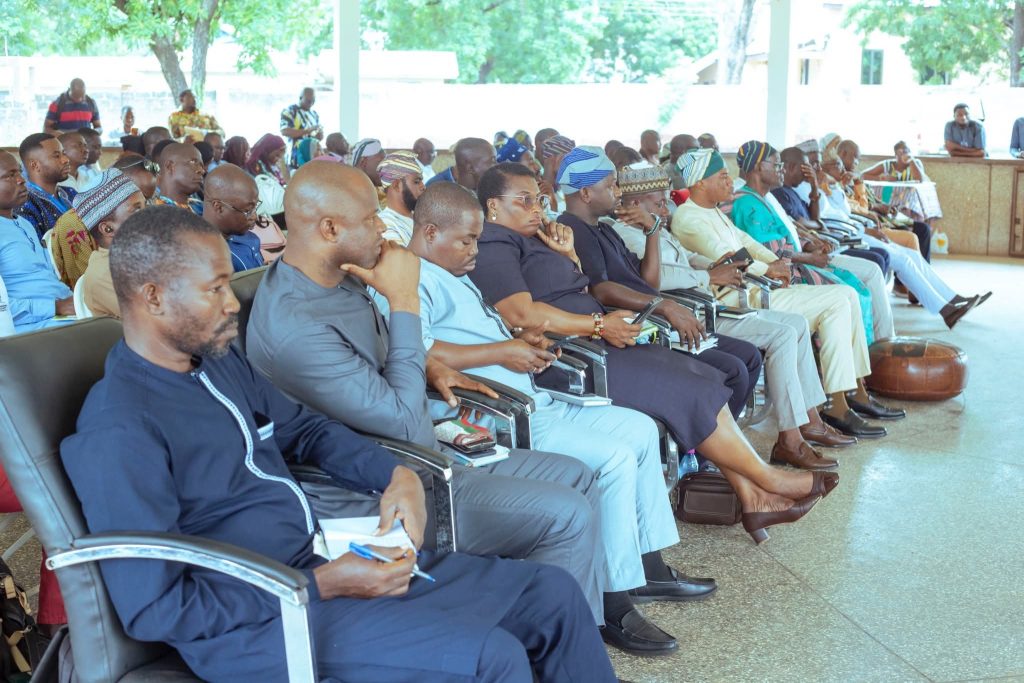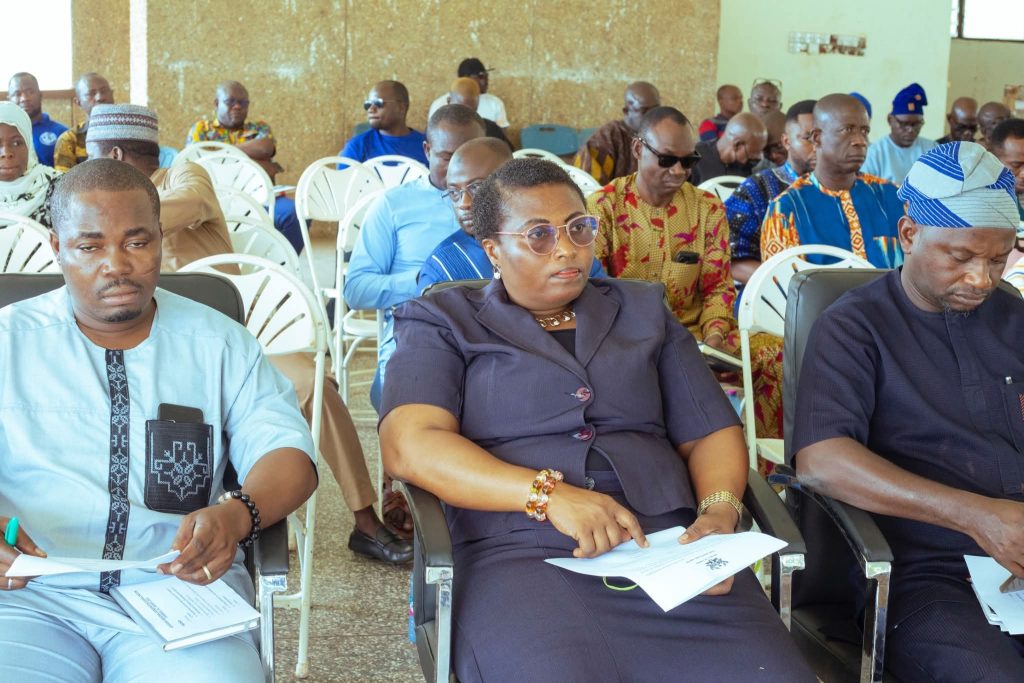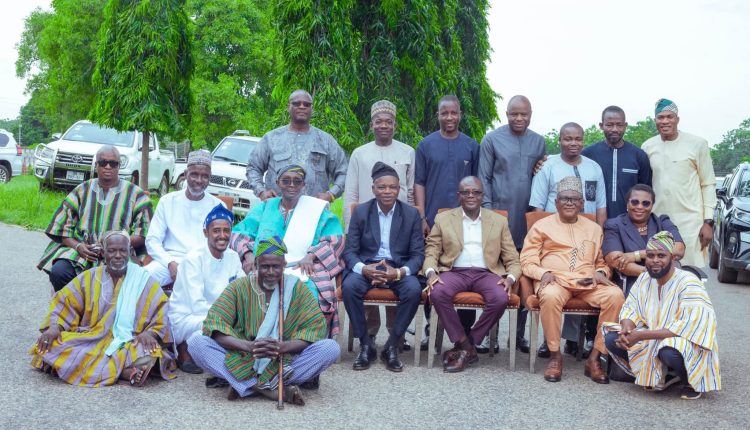On Thursday, August 21, 2025, the Northern Regional Coordinating Council (NRCC) took a significant step toward charting the region’s development trajectory with the swearing-in of 36 new members at the Residency Round Pavilion in Tamale. This maiden meeting, presided over by the Northern Regional Minister, Hon. Ali Adolf John, was not only an induction ceremony but also a forum where the minister outlined the development priorities of his administration for the next four years.
The solemnity of the occasion was underscored by a moment of silence. Hon. Ali Adolf John led the council in honoring the memory of eight compatriots who perished in a helicopter crash earlier this month. Among the victims were a former Northern Regional Minister and a Member of Parliament whose contributions to the region’s growth were remembered with reverence. This gesture set the tone for a gathering that was as much about reflection as it was about charting a new path.
The Chief Director of the RCC, Mr. Sumaila Ewuntomah Abuse, formally welcomed participants and restated the council’s mandate under the Local Governance Act, 2016 (Act 936). He reminded members—comprising Metropolitan, Municipal and District Chief Executives (MMDCEs), Presiding Members, traditional leaders, and heads of departments—that their responsibility extended beyond administrative coordination. They are charged with ensuring that government policies are effectively implemented and that assemblies across the region remain accountable to the people.

In his keynote address, the Regional Minister laid out a comprehensive agenda touching on key development pillars. Governance and accountability came first. He congratulated the MMDCEs on their appointments but cautioned them against any misuse of the District Assemblies’ Common Fund (DACF). For him, transparent leadership and service delivery centered on citizens must remain the guiding principles of local governance.
Agriculture and food security were highlighted as urgent concerns. Last year’s drought had devastated crop production, threatening livelihoods and deepening food insecurity. However, interventions from development partners, particularly the World Food Programme (WFP), helped avert famine through monthly mobile cash transfers to vulnerable households. Building on this, Hon. Ali Adolf John emphasized the government’s Feed Ghana Programme, which aims to modernize agriculture through farmer service centers, smart farming practices, and support for livestock and aquaculture. He urged MMDAs to take ownership of these initiatives, stressing that food security is central to both local stability and national prosperity.
Education and youth empowerment were also prioritized. The minister noted that government policies—such as free tuition for first-year tertiary students, the extension of Free SHS to selected private schools, and free education for students with disabilities—were designed to expand access and remove barriers. He stressed the importance of technical and vocational training as a way of equipping young people with employable skills, linking education directly to economic opportunity.
On healthcare, Hon. Ali Adolf John announced that government had cleared arrears owed to National Health Insurance Scheme (NHIS) providers, signaling a renewed commitment to strengthening the health system. He introduced the Mahama Cares initiative and directed assemblies to build at least two Community Health Planning Services (CHPS) compounds each, to expand primary healthcare. The procurement of dialysis machines, he revealed, was also underway to respond to the growing burden of kidney-related diseases.
Turning to infrastructure, sanitation, and energy, the minister painted a mixed picture of progress and challenge. While water supply in Tamale and Yendi is expected to improve following the replacement of aging pipelines, sanitation remains a stubborn problem. Littered communities and clogged drains, he said, undermine public health and contradict the goal of building a healthy society. To address this, sanitation budgets are being decentralized to the MMDAs, with sanctions awaiting assemblies that fail to deliver. On energy, he acknowledged improved power supply but expressed dissatisfaction with poor street lighting, particularly in Tamale and Sagnarigu. Requests for more street lamps have been made to the Ministry of Local Government to address the problem.
The minister also underscored the government’s continuation of the District Road Improvement Programme (DRIP), inherited from the previous administration. He expressed optimism that the President’s Big Push initiative, a US$10 billion infrastructural plan, would accelerate job creation and address longstanding infrastructural deficits in the Northern Region.

No development agenda, however, can thrive without peace and stability. The Regional Minister commended the security services for restoring calm in Zabzugu and Nanumba South earlier this year. Yet he raised concerns about ongoing chieftaincy disputes in Nanton and Bimbilla, warning that scarce resources should not be wasted on avoidable conflicts. He appealed to chiefs and religious leaders to play their part in fostering reconciliation and harmony.
The meeting concluded with contributions from MMDCEs, traditional authorities, and departmental heads, all pledging support to the Regional Minister’s vision. The message was clear: development in the Northern Region will require collective effort, discipline, and unity of purpose.
As Hon. Ali Adolf John aptly put it in his closing charge: “We must work with urgency, unity and discipline to tackle the development needs of our region.” His words capture both the weight of expectation and the opportunity that lies ahead for the Northern Regional Coordinating Council.


